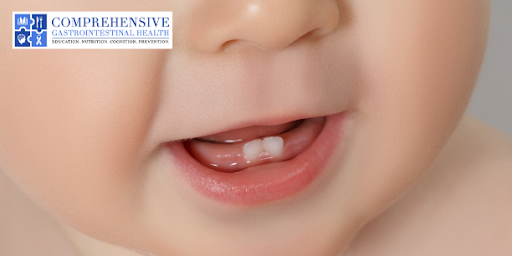METALS IN BABY TEETH PREDICT IBD LATER IN LIFE

METALS IN BABY TEETH PREDICT IBD LATER IN LIFE
Check out this SMALL but interesting study highlighted in MedPage Today from Mt. Sinai Hospital in New York, a highly respected IBD center of excellence. The study suggests that “environmental exposure to metallic toxins in early life may be a risk factor for inflammatory bowel disease (IBD), and may help explain the rising incidence of IBD in the urbanized world, according to a small study of Portuguese children’s deciduous teeth.”
MedPage Today: Metals in Baby Teeth Tied to Inflammatory Bowel Disease Later in Life
“In a study published in Gastroenterology, Joana Torres, MD, PhD, of Icahn School of Medicine’s Mount Sinai Road to Prevention Group in New York City, and colleagues compared 28 baby teeth — preserved by parents at natural shedding according to Portuguese custom and provided by 12 adult IBD patients and 16 unaffected controls — and found significant differences in uptake of four metals in the primary teeth of those who eventually developed IBD versus controls.”
“IBD is known to arise from a complex interplay between genes and the environment. Smoking, appendicitis, oral contraceptive pills, diet, breastfeeding, infections/vaccinations, antibiotics, helminths, and childhood hygiene are among the specific environmental risk factors that have been implicated in the increased worldwide incidence of IBD.”
“While blood tests can detect a metal of interest, such as lead, at any given time, they cannot reveal past exposures or time-stamp when they happened. However, baby teeth, like the growth rings of trees, retain information incrementally, storing evidence of environmental exposure, from their initial development in the womb until they are shed.”
“This study showed differences in the uptake of lead, copper, zinc, and chromium during intrauterine and early postnatal life in individuals who eventually developed IBD compared with controls.”
“The data suggests that metal exposure during a critical window in early life may be a risk factor for IBD,” said co-author Manish Arora, PhD, also of the Icahn School of Medicine at Mount Sinai.”
“Study limitations, the researchers said, included the small and homogeneous sample size, as well as the inability of the associative findings to determine if increased metal uptake is driven by genetic susceptibility or other factors, and what the consequences of metal exposure might be for the inchoate immune system, gut barrier, and microbiome.”
Although there is still so much to learn regarding the environmental impact on the development and disease course of IBD, our comprehensive team of caregivers are eager to share what we know at this time in terms of nutrition, the gut microbiome, the mind-gut connection, physical activity, as well as traditional medications.
Our gastroenterologist, nurse practitioner, dietitian, and counselor are all available via TELEMEDICINE or in person if needed. Call 224.407.4400 or visit compgihealth.com to schedule a visit or learn more.
